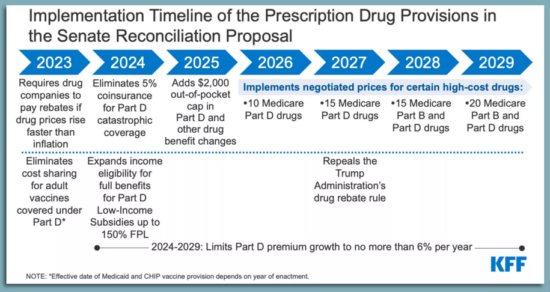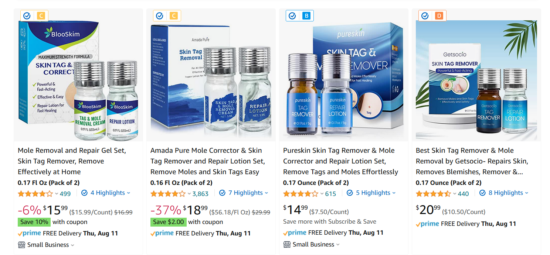When long Covid means dementia, clot-busting dangers, zombie pigs, and more
10 Aug 2022
Posted by Andrew Kantor
Pharmacists are #25
On the latest list of “50 Highest Paying Medical Jobs in the U.S.” that is, just below prosthodontists and just above optometrists. (Topping the list are cardiologists and anesthesiologists, if you’re thinking of a second career.)
PBM to provide $35 insulin
Optum (the PBM) is going to be offering Sanofi’s insulin products at $35 a month for people who don’t have health insurance.
All they have to do is go to the Optum Store (essentially the retail pharmacy), “get qualified,” and they’ll get a card allowing them to get Sanofi insulin for $35 at any retail pharmacy.
Could Optum be doing this out of the goodness of its heart? Maybe. But then there’s this: “A mail service option will soon be available for people who prefer home delivery through the Optum Store.”
We reported, you decide.
Medicare changes in a chart
So what exactly does the soon-to-pass Inflation Reduction Act mean for Medicare pricing and drug companies? The folks at the Kaiser Family Foundation have a handy chart. (It’s part of a deck of charts and info on the effects of the bill.)

Remember, if you’re against allowing Medicare to negotiate drug costs, they’re price controls; if you’re in favor of the new rules, they’re spending controls. Something for everyone!
Stop. Can you smell the roses?
That’s what an Argentinian research team found after studying long Covid and cognitive impairment in about 766 people, most of whom tested positive for Covid-19. The connection became clear.
“All the subjects that had a severe cognitive impairment also had anosmia. We established an association between olfactory dysfunction and cognitive performance and impairment.”
And their analysis showed which way the cause-effect went: “[S]everity of anosmia, but not clinical status, significantly predicted cognitive impairment.”
Why this is the case, well, that’s not clear. Yet. At the moment, though, maybe you shouldn’t let someone make major life decisions if they’ve lost their sense of smell.
The kidney disease hormone
The body uses a hormone called aldosterone to regulate salt and water (this is good). Too much of it, though, like any good thing, is a problem. For patients with chronic kidney disease, it can lead to kidney failure.
It gets worse. The Boston University researchers who discovered this also found that “aldosterone plays a role in the progression not only of [chronic kidney disease] but also heart and blood vessel problems*.”
[E]ach doubling of aldosterone concentrations in the blood was linked to an 11% increased risk of CKD progression. […] The risk was similar regardless of whether or not patients also had diabetes.
The good news is that the existing kidney drug finerenone can counteract the overabundance of aldosterone and help prevent that kidney disease from getting worse.
* Because aldosterone activates the mineralocorticoid receptor, which can lead to high blood pressure, among other issues. But you knew that.
Should you call the clotbusters?
Good news! A combination of aspirin and an anti-platelet agent (e.g., ticagrelor) works a treat to prevent clotting after coronary artery bypass surgery.
Bad news! A combination of aspirin and an anti-platelet agent (e.g., ticagrelor) “carries a significant risk of clinically important bleeding” after coronary artery bypass surgery.
“So,” said the cardiothoracic surgeon and lead author of the study, “the benefit comes at a price.” The advice: “Physicians should base their decisions on patients’ individual circumstances.”
ICYMI: Some (zombie) pig
Charlotte’s Web could’ve had a very different ending.
(Psst: Soviets did it.)
Lyme vax almost ready for prime time
Pfizer is getting ready to start phase-3 trials of the Lyme disease vaccine it bought from Valneva (soon to be called the “Pfizer vaccine,” of course). Millions of hikers and lawn-mowers across the country await the results.
They tested both two- and three-dose regimens and found that three doses works better — that’s what they’ll be testing now. (Doses two and three are given two months and six months after the first, in case you’re interested.)
Obligatory: There was once a Lyme vaccine (Lymerix), but thanks to a combination of anti-vaxxers, hypothetical side effects, price, and a bit of sensationalism, it was pulled from the market in 2001.
FDA slaps Amazon
The retailer got itself a strongly worded letter because some third-party sellers — whose products were fulfilled by Amazon — were selling mole-removal products. And that’s a no-no.
“There are no over-the-counter (OTC) drugs that can be legally sold for mole or skin tag removal,” the agency said, wagging a metaphorical finger.
Despite the letter, at press time a GPhA Buzz investigation* found you could still buy the stuff:

* I searched on “mole removal” on Amazon
It annoys me that these stories get press coverage without a disclaimer
“Eating grapes could hold remarkable potential for health benefits” … according to a study funded by the California Table Grape Commission.


